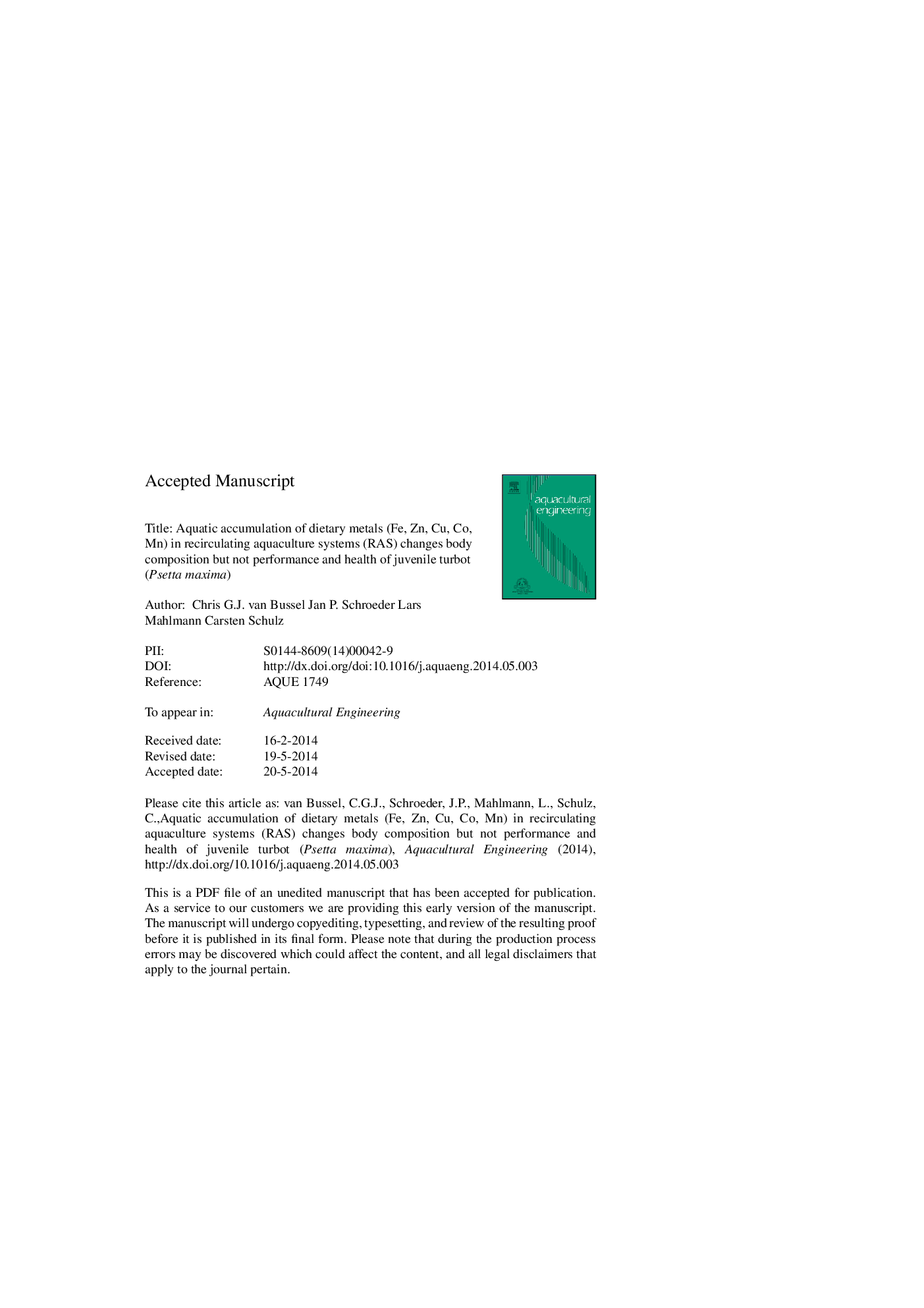| کد مقاله | کد نشریه | سال انتشار | مقاله انگلیسی | نسخه تمام متن |
|---|---|---|---|---|
| 6381281 | 1625709 | 2014 | 26 صفحه PDF | دانلود رایگان |
عنوان انگلیسی مقاله ISI
Aquatic accumulation of dietary metals (Fe, Zn, Cu, Co, Mn) in recirculating aquaculture systems (RAS) changes body composition but not performance and health of juvenile turbot (Psetta maxima)
دانلود مقاله + سفارش ترجمه
دانلود مقاله ISI انگلیسی
رایگان برای ایرانیان
موضوعات مرتبط
علوم زیستی و بیوفناوری
علوم کشاورزی و بیولوژیک
علوم آبزیان
پیش نمایش صفحه اول مقاله

چکیده انگلیسی
Intensification of recirculating aquaculture systems (RAS) production results in decreased water volume used per volume of fish produced. As a consequence metabolites, including the main dietary metals iron, zinc, copper, cobalt and manganese accumulate in the culture water, but effects of such sub-lethal concentrations on growth and health of marine fish species are still unknown. Therefore, five small-scale experimental RAS were filled with seawater and a mixture of iron, zinc, copper, cobalt and manganese, simulating the metal accumulation at water exchange rates of 1000, 330, 100, 33 and 10 l/kg feed applied. A total of 90 juvenile turbot (Psetta maxima) (16.8 ± 0.1 g) were randomly distributed to the 5 RAS and fed ad libitum with a commercial diet for 63 days. Water concentrations of zinc, copper and cobalt were stable over time. Iron showed a quick precipitation in RAS water, t1/2 was 1.4 ± 0.7 days. Manganese showed a slower reduction in RAS water, t1/2 was 6.3 ± 0.4 days. Production performance, assessed as growth, feed intake and feed conversion was not significantly affected by treatment (p > 0.05). Health status, assessed as mortality, relative liver size, relative spleen size and total hemoglobin content was neither significantly affected by treatment (p > 0.05). Amounts of dissolved metals in RAS water were reflected in turbot body composition. Correlations between dissolved metal exposure and metals in whole body were found significant (p < 0.05) for zinc, manganese and cobalt but not for iron and copper. Dry matter content significantly decreased with increasing metal exposure (p < 0.05), in contrast crude ash content did not change. Since turbot grow-out time in RAS may take up to 3 years, toxic effects of metal bioaccumulation cannot be excluded. However, the absence of effects on health and production performance during the present study does not indicate that metal accumulation is a main factor limiting turbot grow-out in RAS.
ناشر
Database: Elsevier - ScienceDirect (ساینس دایرکت)
Journal: Aquacultural Engineering - Volume 61, July 2014, Pages 35-42
Journal: Aquacultural Engineering - Volume 61, July 2014, Pages 35-42
نویسندگان
Chris G.J. van Bussel, Jan P. Schroeder, Lars Mahlmann, Carsten Schulz,